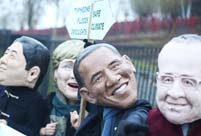Iran struck a historic deal with six world powers yesterday, agreeing to a temporary freeze of its nuclear program in the most significant agreement in more than three decades of estrangement.
Iranian President Hassan Rouhani endorsed the agreement, which commits Iran to curb its nuclear activities for six months in exchange for limited and gradual sanctions relief, including access to US$4.2 billion from oil sales. The six-month period will give diplomats time to negotiate a more sweeping agreement.
The package includes freezing Iran’s ability to enrich uranium at a maximum 5 percent level, which is well below the threshold for weapons-grade material and is aimed at easing Western concerns Tehran could one day seek nuclear arms.
US President Barack Obama hailed the pact’s provisions, which include curbs on Iran’s enrichment and other projects that could be used to make nuclear arms, as key to preventing Iran from becoming a nuclear threat. “Simply put, they cut off Iran’s most likely paths to a bomb,” he told reporters in Washington.
For Iran, keeping the enrichment program active was a critical goal. Iran’s leaders view the country’s ability to make nuclear fuel as a source of national pride and an essential part of its insistence at nuclear self-sufficiency.
In a nationally broadcast speech, Rouhani said the accord recognizes Iran’s “nuclear rights” even if that precise language was kept from the final document because of Western resistance.
“No matter what interpretations are given, Iran’s right to enrichment has been recognized,” said Rouhani, who later posed with family members of nuclear scientists killed in slayings in recent years that Iran has blamed on Israel and allies.
Saying “trust is a two-way street,” Rouhani insisted that talks on a comprehensive agreement should start immediately.
Iranian Foreign Minister Mohammad Javad Zarif, who led his country’s delegation in Geneva, called on both sides to see the agreement as an “opportunity to end an unnecessary crisis and open new horizons.”
But initial reaction in Israel was strongly negative. Israel’s Prime Minister Benjamin Netanyahu called the deal a “historic mistake.”
Speaking to his Cabinet, Netanyahu said Israel is not bound by the deal and reserves the right to defend itself.
US Secretary of State John Kerry, who joined the final negotiations along with the foreign ministers of Russia, China, France, Britain and Germany, said the pact will make US allies in the Middle East, including Israel, safer, reducing the threat of war.
The deal marks a milestone between the US and Iran, which broke diplomatic ties 34 years ago when Iran’s Islamic revolution climaxed in the storming of the US Embassy in Tehran.
Since then, relations between the two countries had been frigid to hostile.
 Finland has more eggs in the Chinese basket than any other
Finland has more eggs in the Chinese basket than any other In pictures: PLA's digital equipment
In pictures: PLA's digital equipment  Protesters demonstrate during UN Climate Change Conference in Poland
Protesters demonstrate during UN Climate Change Conference in Poland  Self-made farmer billionaire donates 69 villas at hometown
Self-made farmer billionaire donates 69 villas at hometown Demolition of bizarre rooftop villa in Beijing still in progress
Demolition of bizarre rooftop villa in Beijing still in progress Service seminar for E China train attendants
Service seminar for E China train attendants  Supermodel-turned-designer
Supermodel-turned-designer Cheerleaders light up CBA regular season
Cheerleaders light up CBA regular season  Finland--anytime you want is right time to go: Ambassador
Finland--anytime you want is right time to go: Ambassador Maritime counter-terrorism drill
Maritime counter-terrorism drill College students want partner for sex needs
College students want partner for sex needs Male belly dancer in women’s fitness club
Male belly dancer in women’s fitness club  15 best rivers for travelers in world
15 best rivers for travelers in world National Geographic Traveler Photo Contest
National Geographic Traveler Photo Contest Weekly Sports Photos
Weekly Sports PhotosDay|Week|Month